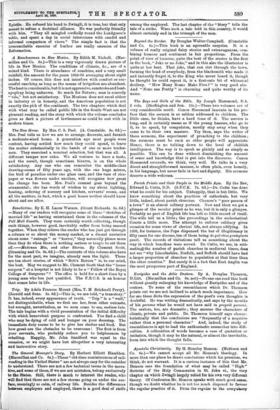Euripides and the Attic Orators. By A. Douglas Thomson, D.Litt.
(Macmillan and Co. 6s. net)—No one can read this book without greatly enlarging his knowledge of Euripides and of the orators. To some of the resemblances which Dr. Thomson points out we are not inclined to attach much importance. How far are these dicta the expression of the poet's own thoughts is doubtful. He was writing dramatically, and says by the mouths of his persona what he would not have said in proprid persona. The orators, too, are dramatic ; they assume the characters of clients, private and public. Dr. Thomson himself says charac- teristically that the conclusions are "frequently of a negative rather than a personal character." Ind, indeed, the study of resemblances is apt to lead the enthusiastic researcher into diffi- culties. A collocation of words becomes a case of quotation or imitation, though it may be the natural, or almost the inevitable. form into which the thought falls.






















































 Previous page
Previous page